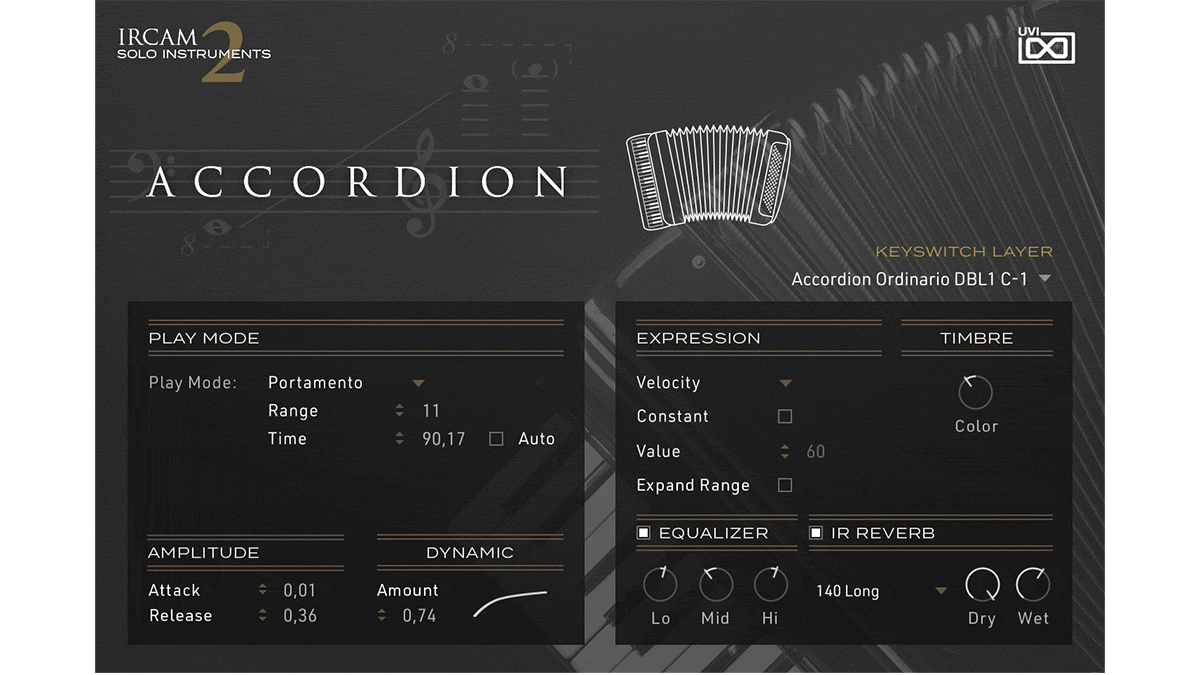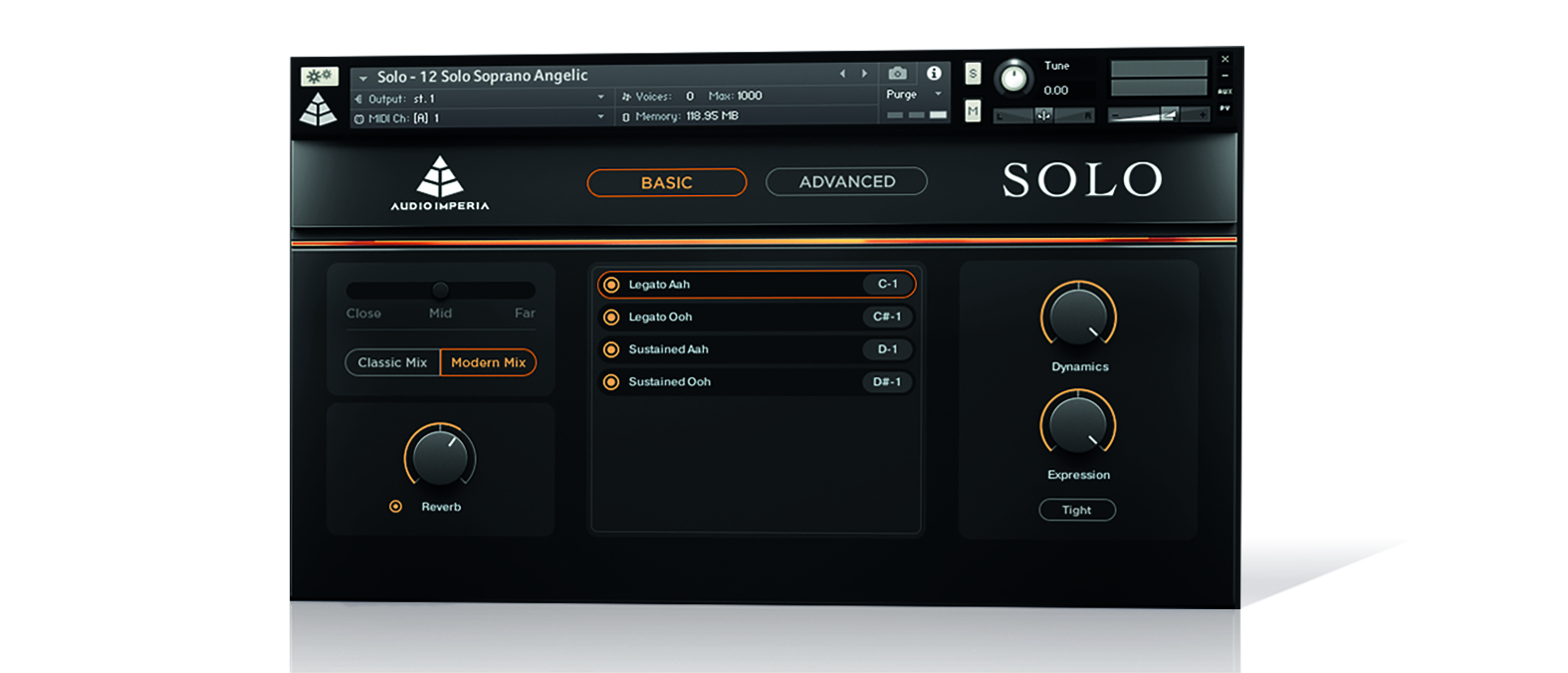MusicRadar Verdict
Solo is a highly usable suite of solo instruments and vocal samples that sounds incredibly classy in all settings.
Pros
- +
Extensive collection of versatile solo instruments.
- +
Incredibly expressive.
- +
Number of articulation options.
- +
The interface is incredibly intuitive.
- +
The sound design elements are amazing.
Cons
- -
No control of vibrato available.
MusicRadar's got your back
Audio Imperia Solo: What is it?
The roster of Audio Imperia sample libraries has been slowly swelling, with an impressive library of cinematic and orchestral sounds which have rightly garnered both user and critical acclaim. While many users demand big, brash sounds sets, there is equal demand for individual instrument samples, which can explore the more subtle end of the spectrum, and that’s where Solo has plenty to offer.
Solo embraces the familiar form of a Kontakt instrument, adopting the preferred NI library status, making light work of both installation and usability. It immediately appears in the library browser, while also being open to use within the free Kontakt player plugin. Solo also conforms to Audio Imperia’s beautiful, clean GUI construct, which offers some appealing layers.
Firstly, each instrument is equipped with a Classic and a Modern mix. The Classic mix is relatively flat and sounds acoustically authentic, whereas the Modern mix is sharp, bright and production-ready. These form part of the Basic setup, where it’s also possible to see-saw between a close and far microphone mix. However, for those wishing for greater control, a quick click on the Advanced tab reveals a full five microphone placements, which may be blended to suit.
Advanced options
While Solo performs beautifully right out of the virtual box, the level of control available is something of an industry-leading concept. While the usual control elements, such as timbral and expressive dynamics are immediate, there’s also control of velocity curve and legato smoothing, allowing you to tweak settings to your playing style.
Even more importantly, the sample start pot immediately gets around the issue which is common with orchestral libraries, of inconsistent latency with the articulation of every note. This subtle but useful control literally saves hours of programming time while trying to program samples to sit correctly in the timing pocket.
It’s a unique selling point across all Audio Imperia libraries which is praised by many users, as an enormous aid to workflow. Whatever your preference for Basic or Advanced mode, there’s an immediacy which is a huge boon for all users, while the realism is sublime.
Audio Imperia Solo: Performance and verdict
The choice of instruments is relatively wide, including violin, viola and cello, trumpet and horn, and a full set of the four main woodwind instruments, which also includes cor anglais. As a useful addition, two soprano vocal samples embrace both operatic tendencies and a purer soprano timbre, which is described as Angelic.
Want all the hottest music and gear news, reviews, deals, features and more, direct to your inbox? Sign up here.
All of the samples are equipped with a plentiful helping of articulation variation, which are open to multisample format or individual patch formation. The individual patches are useful if you are struggling with RAM allocation. The overarching sense is how expressive these samples are. Each note attack is followed by a delayed vibrato, which leaves you smiling at the level of musicality oozing from each note.
Thanks to some clever programming, subtle control relating to re-bowing or re-tonguing may be activated through velocity control, or via MIDI CC. Due to its expressive nature, the library does lend itself to sweeping melodic gestures, at least in its legato form. It is very impressive, but with plenty of shorter and more punctuating samples for more agitated playing moments.

• UVI IRCAM Solo Instruments 2
A library of solo acoustic instruments that offers a truly unique palette.
• Cinematic Studio Series Solo Strings
Limited to a string quartet but it’s an impressive package.
The library offers plenty of highlights, with the melancholy oboe and cor anglais proving to be highly effective and evocative. The Angelic soprano patch is also particularly cinematic, offering Oohs and Aahs. Particular mention has to be made of the legato patching, which is incredibly realistic. When you get great samples like this, you just want to play them, and that’s certainly the case for the next element which could be regarded as the joker in the Solo pack.
Audio Imperia has an unbelievably strong reputation for sound design, always including such elements among their acoustic libraries. With the inclusion of 13 acoustically derived pad textures, Solo does not disappoint. If you need impressive pads, completely production ready, these are amazing, and a very welcome addition to this very classy compendium.
If you bundle the comprehensive effects section, with Audio Imperia’s usual impressive level of sample control, you have a highly competitive pack. Solo is packed full of expressive realism, with some very tempting oddities.
MusicRadar verdict: Solo is a highly usable suite of solo instruments and vocal samples that sounds incredibly classy in all settings.
Audio Imperia Solo: Hands-on demos
Audio Imperia
Sample Library Review
Christopher Siu
Audio Imperia Solo: Specifications
- 13 incredibly expressive & lyrical soloists.
- 5 mic positions and 2 ready-to-go mixes (Classic + Modern).
- Two types of long-form true legato for all instruments.
- Additional articulations and sound design.
- Approximately 90 GB installed (NCW format).
- Made for the free Kontakt Player, Version 6.5.2 or higher.
- NKS ready.
- CONTACT: Audio Imperia
Computer Music magazine is the world’s best selling publication dedicated solely to making great music with your Mac or PC computer. Each issue it brings its lucky readers the best in cutting-edge tutorials, need-to-know, expert software reviews and even all the tools you actually need to make great music today, courtesy of our legendary CM Plugin Suite.

